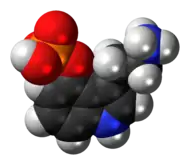Norbaeocystin
Norbaeocystin is a psilocybin mushroom alkaloid and analog of psilocybin. It is found as a minor compound in most psilocybin mushrooms together with psilocin, psilocybin and baeocystin, from which it is a derivative.[1]
 | |
 | |
| Clinical data | |
|---|---|
| Routes of administration | Oral |
| ATC code |
|
| Legal status | |
| Legal status |
|
| Identifiers | |
IUPAC name
| |
| CAS Number | |
| PubChem CID | |
| ChemSpider | |
| UNII | |
| KEGG | |
| ChEBI | |
| Chemical and physical data | |
| Formula | C10H13N2O4P |
| Molar mass | 256.198 g·mol−1 |
| 3D model (JSmol) | |
SMILES
| |
InChI
| |
| (verify) | |
Norbaeocystin is a N-demethylated derivative of baeocystin (itself a N-demethylated derivative of psilocybin), and a phosphorylated derivative of 4-hydroxytryptamine. The latter is notable as a positional isomer of serotonin, which is 5-hydroxytryptamine.
See also
- Aeruginascin
- Baeocystin
- Norpsilocin
- Psilocybin
References
- Leung AY, Paul AG (October 1968). "Baeocystin and norbaeocystin: new analogs of psilocybin from Psilocybe baeocystis". Journal of Pharmaceutical Sciences. 57 (10): 1667–71. doi:10.1002/jps.2600571007. PMID 5684732.
|
This article is issued from Wikipedia. The text is licensed under Creative Commons - Attribution - Sharealike. Additional terms may apply for the media files.